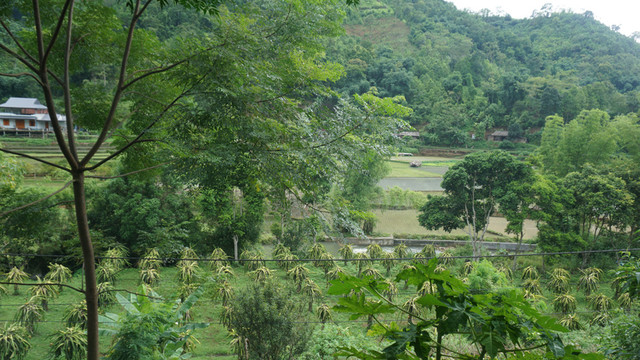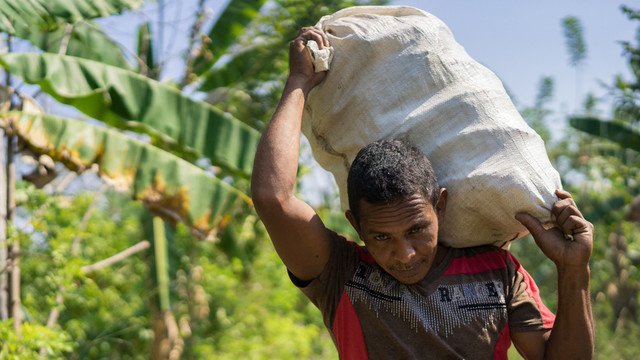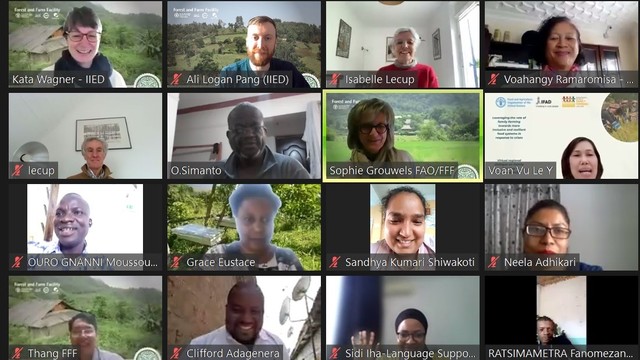IIED at the IUCN World Conservation Congress
IIED and its partners were at the World Conservation Congress in Hawai'i from 1-10 September 2016.

Held every four years, the IUCN World Conservation Congress helps to shape the direction of conservation and sustainable development.
The theme of the IUCN Congress 2016 was 'Planet at the crossroads' and it was one of the first major international events since the adoption of the 2030 Sustainable Development Agenda and the Paris Agreement. The World Conservation Congress was instrumental in defining the path for moving those agreements into action.
Congress objectives
The congress aimed to:
- Inspire the international community to take action for nature by demonstrating its critical role as our life support system
- Showcase inspiring examples of where conservation has delivered tangible benefits for biological diversity, people and sustainable development
- Bring together IUCN members to address urgent issues, agree new priorities and take action on conservation, and
- Launch the Hawai'i commitments to meet the conservation challenges of our time, including scaling up action on biodiversity and the sustainable development goals.
Members of IIED's Natural Resources research group and partners attended the congress, and played a key role in a number of events and activities, which are detailed below.
We showcaseda number of IIED projects which include biocultural heritage, ecosystem-based adaptation, social assessment of protected areas, food demand and forests, and locally controlled forestry.
IIED and partner events
Making ecosystem-based adaptation effective: evidence from the field to improve policy and practice
Conservation campus
Date: Saturday, 3 September
This campus aimed to showcase as well as deliberate upon the effectiveness of ecosystem-based adaptation (EbA) for enhancing resilience of both humans and ecosystems. This was done through highlighting evidence and lessons learned that have been generated from the practical use of EbA methods and tools in multiple countries. The relevance of EbA and how it can be applied in various contexts was also highlighted.
It brought together climate scientists, adaptation practitioners, policymakers, and private sector organisations working on issues at the intersection of climate adaptation, ecosystems and human resilience. By showing examples of application in various contexts, it built the participants’ capacities and encourage them to integrate different tools in their future project planning and execution. Particular emphasis was given to sharing practical case studies within the context of Ecosystem based Adaptation. This was followed by discussion on methodologies and practices that would provide information on the cost-effectiveness of EbA and also on its co-benefits.
This event was organised by others but featured an IIED partner and IIED work.
Related reading: Ecosystem-based approaches to climate change adaptation | Ecosystem-based approaches to adaptation: strengthening the evidence and informing policy. Research overview and overarching questions
The value of community-to-community exchange: strengthening networks
UNDP Kauhale
Date: Saturday, 3 September
This UNDP Equator Initiative event provided an opportunity to share the experiences of existing networks involving Indigenous Peoples and local communities, and the importance of community to community exchange in learning, scaling out work, and network building.
Speakers discussed methodologies used to enable community-to-community exchange, how and why the networks were developed, the challenges they have faced, and the components that are needed to ensure their growth and relevance in a digital age. Outcomes of the International Network of Mountain Indigenous Peoples INMIP), which is led by Asociacion ANDES with support from IIED, were shared, in addition to the Biodiversity and Community Health (BaCH) workshop, the ICCA Consortium learning networks and the Equator Initiative's WIN network's peer-to-peer knowledge exchanges. Krystyna Swiderska from IIED presented INMIP's objectives and the results of its third walking workshop in China.
This event was organised by UNDP but featured IIED and the work of its partner ANDES.
Related reading: Biocultural heritage website | Mountain peoples call for support to protect traditional knowledge | Stone Village Declaration (May 2016) | Photofilm profiling biocultural heritage territories (en Espanol)
Designing a biocultural heritage indication scheme
Knowledge Café
Date: Saturday, 3 September
This Knowledge Café session explored the development of a rights-based certification tool to address concerns related to the loss of traditional knowledge, to promote the maintenance of biological and cultural diversity, and as a potential instrument to promote endogenous actions on poverty alleviation and sustainable community development. Most certification schemes aimed at promoting equity and conservation have not widely benefited indigenous peoples to date.
Biocultural heritage is a holistic concept which embraces socio-economic, environmental and political (human rights) issues of indigenous peoples' worldwide. It offers an alternative approach for certifying products and services arising from indigenous territories, biodiversity, traditional knowledge and culture – one that responds directly to indigenous peoples' priorities and needs. The discussion focused on the shortcomings of existing certification schemes; how biocultural indications are linked to indigenous territorialities and endogenous development/pro-poor sustainable green growth, using examples from Peru, China, New Zealand and beyond; and developing a biocultural heritage indication scheme.
This event was co-organised by IIED, ANDES and IUCN-CEESP.
Related reading: Biocultural Heritage | Designing an effective biocultural heritage indication labelling system
Assessing equitable management and governance of protected areas
Knowledge Café (invitation only)
Date: Sunday, 4 September
This Knowledge Café session was designed for conservation policymakers and practitioners that are engaged in the international discourse on how to measure progress versus the equitable management element of Aichi Target 11. Drawing on recent work by the partners to develop a framework of equity principles for protected area conservation, the session explored different perspectives on the equitable management issue and its relationship to protected area governance quality, options for equity indicators, and a process to develop specific recommendations targeting key international conservation agencies.
This event was co-organised by IIED and partners.
Social assessment for protected areas
Workshop
Date: Sunday, 4 September
This workshop was designed for conservation practitioners with an interest in assessing the positive and negative impacts of protected areas on human wellbeing and related governance issues, and applying these results to achieve more effective and equitable conservation. Focusing on the Social Assessment for Protected Areas (SAPA) methodology, participants reviewed results from four sites in Africa, explored SAPA's strengths and limitations, linkages between PA social assessment, PA governance assessment and equity, and opportunities for scaling up.
This event was co-organised by IIED and partners.
Related reading: Assessing social impacts of protected areas | From livelihoods to equity for better protected area conservation | Social assessment for protected areas (SAPA): methodology manual for SAPA facilitators | Social Assessment of Protected Areas (SAPA) at Ruwenzori Mountains National Park, Uganda | Social Assessment of Protected Areas (SAPA) at Ol Pejeta Conservancy, Kenya | Social Assessment of Protected Areas (SAPA) at Montsde Cristal, Gabon
Securing the future: building partnerships for managing risk and resilience of locally controlled forest business
Pavilion event
Date: Monday, 5 September
This multi-stakeholder event launched a book describing eight locally controlled forestry enterprises' approach to risk management in Africa, Asia and Latin America. The event explored the main sources of risks perceived by the community owners and managers of those enterprises and provide examples of how these are managed in their particular context, using specific tactics and strategies.
Locally controlled forestry enterprises (LCFE) and their associations offer particular advantages for forest protection and poverty reduction. They accrue wealth locally, empower local entrepreneurship, strengthen social networks and create incentives for forest landscape restoration. Despite numerous examples of viable and even profitable LCFEs many family, community and indigenous forest enterprises are often seen as high risk for conventional investment (and often also development support) programmes, but very little is actually known about how they manage risks.
This event was co-organised by IIED and partners.
Related reading: Forest Farm Facility | Securing the future: managing risk and building resilience within locally controlled forest businesses | Securing forest business: a risk management toolkit for locally controlled forest businesses
Scaling up nature-based solutions for adaptation and building resilience: linking practice and policies
Workshop
Date: Monday, 5 September
Nature-based solutions involve the use of biodiversity and ecosystem services to help people adapt to shocks including climate change, and build resilience to bringing about transformation for the ecosystem dependent communities.
This highly participatory process shared innovative methodologies developed by IIED, IUCN, and its partners to understand nature-based solutions, foster a better understanding of its effectiveness and forge strategic partnerships/opportunities to influence national and international policymaking.
This event was co-organised by IIED and partners.
Related reading: Ecosystem-based approaches to climate change adaptation



